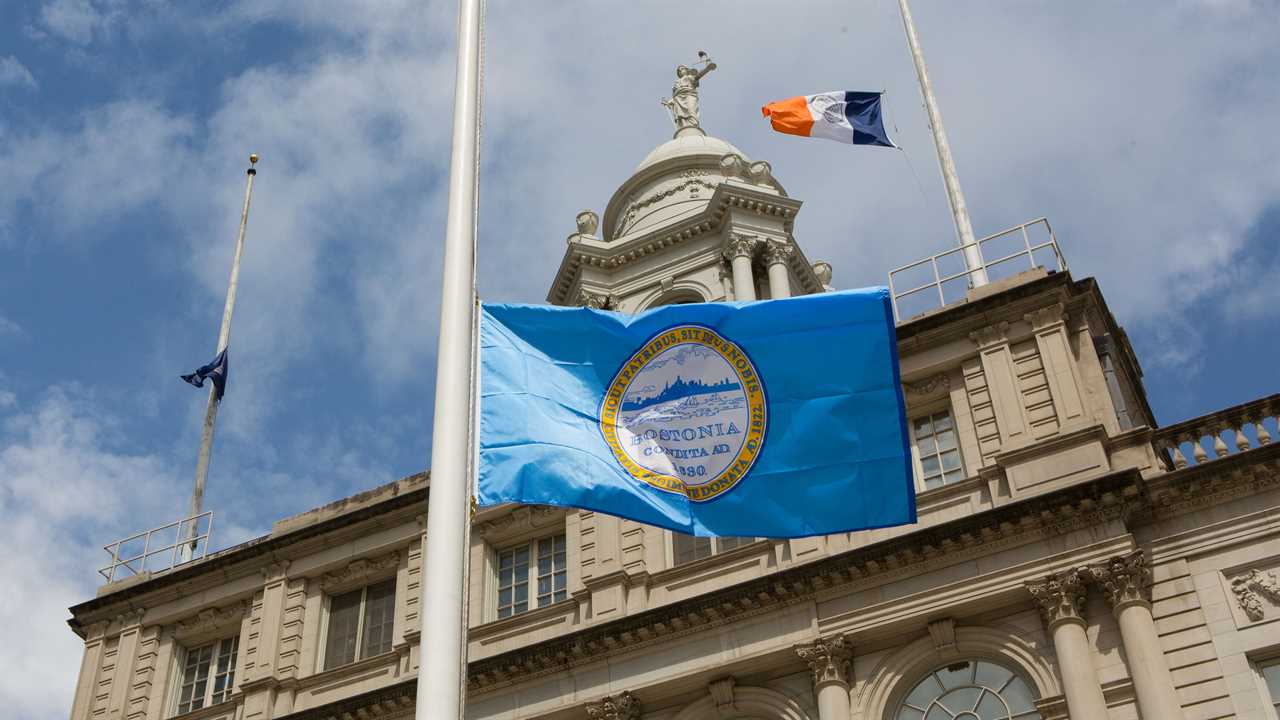
WASHINGTON — There are three flagpoles in front of Boston’s City Hall. One flies the American flag, and the second that of Massachusetts. What appears on the third is at issue in a case the Supreme Court will hear in January.
That flagpole, which ordinarily flies the flag of Boston, is occasionally made available to groups seeking to celebrate their backgrounds or to promote causes like gay pride. In a 12-year period, the city approved 284 requests for the third flag.
It rejected only one, from Camp Constitution, which says it seeks “to enhance understanding of our Judeo-Christian moral heritage.” The group’s application said it sought to raise a “Christian flag” for one hour at an event that would include “short speeches by some local clergy focusing on Boston’s history.” The flag bore the Latin cross.
The city rejected the request, saying that flying the flag would amount to government endorsement of religion. The group sued, arguing that the city’s decision violated its right to free speech.
A unanimous three-judge panel of the United States Court of Appeals for the First Circuit, in Boston, ruled for the city, largely on the ground that the government is entitled to choose the messages it endorses.
“The city controls which third-party flags are flown from the third flagpole,” Judge Bruce M. Selya wrote for the panel, adding that “all 284 flags previously flown were flags of countries, civic organizations or secular causes.”
The Supreme Court, which has grown increasingly sensitive toward what its conservative majority sees as government hostility to religion, agreed in October to hear Camp Constitution’s appeal.
Last week, the group gained an important ally. The American Civil Liberties Union, which has often sued to bar religious displays on government property, filed a brief supporting Camp Constitution, saying Boston had violated its free speech rights.
“We have long expressed concern about government endorsement of religion,” said David Cole, the A.C.L.U.’s national legal director. “But when the government opens a forum to private speakers generally, as Boston did here, it can’t turn away a speaker simply because it is religious.”
“We don’t agree with Camp Constitution’s views,” he added, “but we defend its right to express them.”
The Biden administration also filed a brief last week urging the Supreme Court to reverse the First Circuit’s decision in the case, Shurtleff v. City of Boston, No. 20-1800. “The city cannot generally open its flagpole to flags from private civic and social groups while excluding otherwise similar groups with religious views,” the brief said.
In previous cases, the Supreme Court has sometimes struggled to distinguish the government’s speech from private speech in a public forum. One concerned the Confederate battle flag.
In 2015, in Walker v. Sons of Confederate Veterans, the Supreme Court ruled that Texas could refuse to allow specialty license plates bearing the Confederate flag because the plates were government speech and therefore immune from First Amendment scrutiny. The vote was 5 to 4.
Texas had permitted hundreds of specialty plates bearing all sorts of messages, including ones for college alumni, sports fans, businesses and service organizations. Others sent messages like “Choose Life,” “God Bless Texas” and “Fight Terrorism.”
Understand the Supreme Court’s Momentous Term
The Texas abortion law. After the court let Texas effectively outlaw most abortions in a 5-4 decision, the justices heard arguments that could allow it to reverse course. The case puts Justice Brett Kavanaugh in the spotlight as the most likely member to switch sides.
All were government speech, Justice Stephen G. Breyer wrote for the majority.
“As a general matter,” he wrote, “when the government speaks, it is entitled to promote a program, to espouse a policy or to take a position.” Were this not so, he said, the government would be powerless to encourage vaccinations or promote recycling.
In dissent, Justice Samuel A. Alito Jr. questioned the notion that license plates saying “Rather Be Golfing” or supporting the University of Oklahoma conveyed a government message. The first cannot plausibly represent state policy, he wrote; the second, in Texas at least, bordered on treason during college football season.
In the Texas case, as in the one from Boston, the A.C.L.U. weighed in on the side of free speech.
“The Confederate battle flag was the banner for those who supported slavery and sought to break our nation apart,” the group’s brief said. “It later served as a rallying sign for those seeking to maintain racial separation in all facets of life, from the voting booth to the wedding chapel.”
But government censorship, the A.C.L.U. said, was not the answer.
“However reasonable this distaste for a symbol of racism,” the brief said, “the Constitution does not permit the state to discriminate against messages in a forum it has created for private speech.”
More recently, in Matal v. Tam in 2017, the Supreme Court unanimously ruled that the government could not refuse to register trademarks for potentially offensive names.
“It is far-fetched to suggest that the content of a registered mark is government speech,” Justice Alito wrote for the court. “If the federal registration of a trademark makes the mark government speech, the federal government is babbling prodigiously and incoherently. It is saying many unseemly things. It is expressing contradictory views.”
If the flag in the Boston case is like a license plate, Camp Constitution should lose. If it is like a trademark, it should win. But it cannot hurt, before the current Supreme Court, that the message it seeks to convey is religious.






